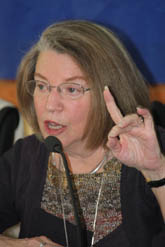Nancy Fraser is one of the leading political philosophers and feminist theorists practicing today. Her writing addresses issues of concern to a broad audience, including globalization, cosmopolitanism, identity politics, neoliberalism, the welfare state, and gender issues. She is at present the Henry A. and Louise Loeb Professor of Philosophy and Politics at the New School for Social Research.
Professor Fraser's work has had a profound impact for two main reasons. First, her approach is explicitly and fundamentally interdisciplinary. Her work synthesizes the methods, materials, and concerns of political science, philosophy, cultural and social theory, history, and law. Second, Professor Fraser has a talent for building bridges between the world of abstract theory and the world of policy/legal issues. Her scholarship has brought feminist analysis and critical theory to bear on some of the most challenging practical issues facing developed democracies. She develops and critiques theoretical frameworks, drawing on post-structuralism, discourse ethics, and feminist theory, and she applies these theoretical insights to pressing issues of public concern, including the understanding of need and dependency in the welfare state, multiculturalism and identity politics, and the role of multiple publics in the functioning of democracy.
Professor Fraser's present research attempts to reformulate theories of justice in what she has described as a postnational framework. Most of the dominant theories of political and social justice have more or less presupposed the nation-state either as a starting point or as the most desirable place for its achievement. Yet globalization and the many pressures it places on the nation-state generates numerous intellectual as well as practical dilemmas for nationally-based concepts of justice. As part of this work, Fraser addresses a host of related questions of broad public interest: in the pursuit of justice, how should we conceive of the relationship between identity (e.g., racial and gender identity) and the broader struggle for expanded political and social equality? What place can and should democratic participation have in our globalizing world and in emerging postnational institutions (e.g., the WTO or the UN)? To what extent do we need to rethink the traditional concepts of political and social thought and institutions (e.g., concerning political representation) in light of globalization?
Professor Fraser has written eleven books, including Unruly Practices: Power, Discourse, and Gender in Contemporary Social Theory (University of Minnesota and Polity Press 1989), Justice Interruptus: Critical Reflections on the Postsocialist Condition (Routledge 1997), and Stretching the Radical Imagination: Beyond the Unholy Alliance of Identity Politics and Neoliberalism (Verso 2010). In addition, she has written over sixty articles and book chapters. Her stature as a scholar is also evidenced by the impressive list of honors and academic recognitions she has received, including the Storrs Lectures at Yale Law School, the Tanner Lectures on Human Values at Stanford University, and the Chaire Blaise Pascale at the Ecole des hautes etudes en sciences socials in Paris.


